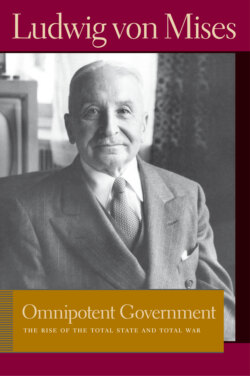Читать книгу Omnipotent Government - Людвиг фон Мизес - Страница 24
На сайте Литреса книга снята с продажи.
4. The Current Explanation of the Success of Militarism
ОглавлениеAll over the world the overwhelming victory of German militarism is interpreted in accordance with the legends developed by the propaganda of the German Social Democrats. The socialists assert that the German bourgeoisie seceded from the principles of freedom and thus betrayed the “people.” Based on Marxian historical materialism absurd theories concerning the essence and the development of imperialism were invented. Capitalism, they say, must result in militarism, imperialism, bloody wars, Fascism, and Nazism. Finance and big business have brought civilization to the verge of destruction; Marxism has the task of saving humanity.
Such interpretations fail to solve the problem. Indeed, they try purposely to put it out of sight. In the early 1860’s there were in Germany among the politically minded a few supporters of dynastic absolutism, of militarism and of authoritarian government, who strongly opposed the transition to liberalism, democracy, and popular government. This minority consisted mainly of the princes and their courtiers, the nobility, the commissioned officers of higher ranks, and some civil servants. But the great majority of the bourgeoisie, of the intellectuals, and of the politically minded members of the poorer strata of the population were decidedly liberal and aimed at parliamentary government according to the British pattern. The liberals believed that political education would progress quickly; they were convinced that every citizen who gave up political indifference and became familiar with political issues would support their stand on constitutional questions. They were fully aware that some of these newly politicized men would not join their ranks. It was to be expected that Catholics, Poles, Danes, and Alsatians would form their own parties. But these parties would not support the King’s pretensions. Catholics and non-Germans were bound to favor parliamentarism in a predominantly Protestant and German Reich.
The politicization of the whole country went on faster than the liberals had foreseen. At the end of the ’seventies the whole people was inspired by political interests, even passions, and ardently took part in political activities. But the consequences differed radically from those expected by the liberals. The Reichstag did not earnestly challenge the hardly disguised absolutism; it did not raise the constitutional issue; it indulged only in idle talk. And, much more important: the soldiers who now were recruited from a completely politicized nation became so unconditionally reliable that every doubt concerning their readiness to fight for absolutism against a domestic foe was considered an absurdity.
The questions to be answered are not: Why did the bankers and the rich entrepreneurs and capitalists desert liberalism? Why did the professors, the doctors, and the lawyers not erect barricades? We must rather ask: Why did the German nation return to the Reichstag members who did not abolish absolutism? Why was the army, formed for a great part of men who voted the socialist or the Catholic ticket, unconditionally loyal to its commanders? Why could the antiliberal parties, foremost among them the Social Democrats, collect many millions of votes while the groups which remained faithful to the principles of liberalism lost more and more popular support? Why did the millions of socialist voters who indulged in revolutionary babble acquiesce in the rule of princes and courts?
To say that big business had some reasons to support the Hohenzollern absolutism or that the Hanseatic merchants and shipowners sympathized with the increase of the navy is no satisfactory answer to these questions. The great majority of the German nation consisted of wage earners and salaried people, of artisans and shopkeepers, and of small farmers. These men determined the outcome of elections; their representatives sat in Parliament, and they filled the ranks of the army. Attempts to explain the change in the German people’s mentality by demonstrating that the class interests of the wealthy bourgeoisie caused them to become reactionary are nonsensical, whether they are as childish as the “steel plate”* legend or as sophisticated as the Marxian theories concerning imperialism.
